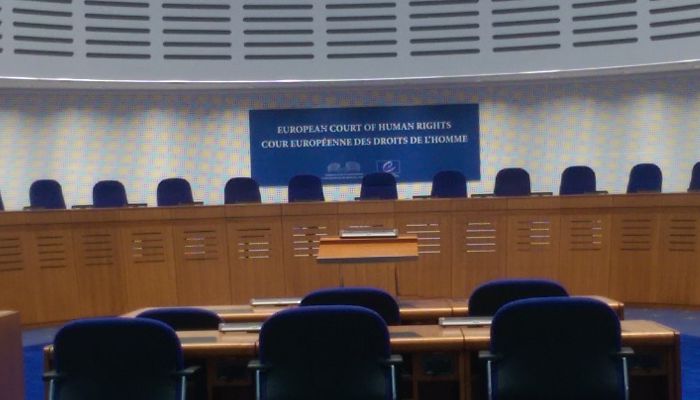Bünyamin Tekin
“We are under a Constitution, but the Constitution is what the judges say it is,” former US Supreme Court Chief Justice Charles Evans Hughes once said.
Whether one thinks this ought to be the case or not, independent judges are also policymakers, as they, especially those in high courts such as the European Court of Human Rights (ECtHR), choose among possible actions, methods and principles when they adjudicate, and by so doing, guide future decisions.
The European Convention on Human Rights (ECHR), which entered into force in 1953 and is considered by many the most effective international treaty for protecting human rights, is also such a document, since observing the enforcement and implementation of the convention is entrusted to the judges of the ECtHR.
Drawing on Hughes’ maxim, which is widely accepted by the law schools of the Anglo-American world, one can also claim that the ECHR is what the judges in Strasbourg say it is.
Cases before the Strasbourg court piling up
Established in 1959, the European court has seen its caseload grow exponentially.
Today its judges are caught between a rock and a hard place, as increasingly authoritarian states that are obliged to implement the convention are violating human rights en masse, and practicalities force the ECtHR to forego some principles in order to remain functional.
“As of September 30, 2021, 68,450 applications were pending at the court,” says Dr. Kemal Şahin, a Turkish law scholar who lives in exile because of the persecution he faced in Turkey, one of the chief reasons for the huge number of applications.

Dr. Şahin, who has worked as a human rights expert at the Council of Europe, lectured at Turkish law schools, been a visiting research fellow at St. John’s University law school, a visiting professor at the University of New Haven and a visiting researcher at Yale Law School, is one of the thousands who had to flee Turkey after the government, under the authoritarian rule of President Recep Tayyip Erdoğan, started a crackdown on civil society, using a controversial coup attempt in 2016 as a pretext to quash dissent.
Following the abortive putsch, the Turkish government declared a state of emergency and carried out a massive purge of state institutions.
More than 130,000 public servants, including 5,705 academics, among them Dr. Şahin, were summarily removed from their jobs for alleged membership in or relationships with “terrorist organizations” by emergency decree-laws subject to neither judicial nor parliamentary scrutiny.
“The applications [before the ECtHR] from Turkey and Russia constitute virtually half of all applications from the 47 Council of Europe countries,” Dr. Şahin says. “And that puts an enormous strain on the resources of the court.”
ECtHR condemns Turkey over post-coup arrest of judges
Detention warrants were issued for 2,745 judges and prosecutors on coup charges as the putsch bid unfolded.
Despite comprising just a fraction of the post-coup mass detentions, their being detained by their colleagues ushered in the death of the rule of law in the country according to observers, as many believe it had a chilling effect on the entire justice system, intimidating the remaining judges and prosecutors into doing the government’s bidding by launching politically motivated investigations into critics.
On November 23, the ECtHR ruled, responding to a complaint brought by 427 members of the Turkish judiciary who were arrested after the failed putsch, that Turkey had acted unlawfully, and ordered Ankara to pay 5,000 euros in damages to each applicant.
The ECtHR judgment stirred debate among Turkish dissidents. Some saw it as a landmark ruling in the fight to redeem justice against the human rights violations perpetrated by Ankara, while others deemed it too little, too late.
What many overlook, however, is found between the lines of legal speak.
The applicants did not just claim they were unlawfully detained; their complaints included other alleged violations. They also said they were not detained on reasonable suspicion, that relevant and sufficient reasons had not accompanied the decisions for their detention and that the length of their pre-trial detention had been excessive.
The ECtHR did not examine these claims.
“Having regard to … the accumulation of thousands of similar applications on its docket concerning detentions in the aftermath of the attempted coup d’état in Turkey, which puts a considerable strain on its limited resources, the Court considers — as a matter of judicial policy — that it is justified in these compelling circumstances to dispense with the separate examination of the admissibility and merits of each remaining complaint raised by each individual applicant under Article 5,” the ECtHR said in its ruling.
“The court is avoiding its duty,” Dr. Şahin says, speaking about the judgment. “And it does so honestly.”
The significance of the ruling was not lost on the panel of judges that issued it as well. Three of them point to how the practicalities the court faces incapacitate it.
“The present judgment is remarkable in an unusual and highly problematic sense. The Court concludes, in effect, that it is faced with a situation that renders it unable to fulfill its function …” the concurring opinion of Judge Pauliine Koskelo, joined by Judge Carlo Ranzoni, said.
“The decision not to examine the applicants’ other complaints raised under Article 5 of the Convention thus has a critically novel quality,” Judge Koskelo said, adding, “I have nonetheless arrived at the conclusion that the time has come to acknowledge the reality as it presents itself: if alleged violations occur on a large scale and the rights concerned are no longer protected through domestic remedies, even the international supervision entrusted to the Court reaches its practical limits.”
“On top of the sheer number of violations, the alternative reality offered by authoritarian leaders and the judiciary’s subservience in bringing charges based on narratives of strong men create the perfect storm for crippling the Strasbourg court,” Dr. Şahin lamented.
Ankara’s crackdown on the Gülen movement
Declaring the 2016 attempted coup a “gift from God” while the bid unfolded, Erdoğan viewed the abortive putsch as an invaluable occasion for him to embark on purges of an independent judiciary, political opponents and critical voices, justifying it as a fight against the putschists.
The government-led purges targeted alleged members of Gülen movement, a faith-based group inspired by Turkish cleric Fethullah Gülen that is regarded as a terrorist organization by Ankara and is accused of masterminding the 2016 abortive putsch, despite the group’s strong denial.
Erdoğan has been targeting the movement since the corruption investigations of December 17-25, 2013, which implicated then-prime minister Erdoğan, his family members and his inner circle.
Dismissing the investigations as a Gülenist coup and conspiracy against his government, Erdoğan designated the movement as a terrorist organization and began to target its alleged members. He locked up thousands including many prosecutors, judges and police officers involved in the investigations as well as journalists.
Immediately after the attempted coup of 2016 Erdoğan again pinned the blame on the Gülen movement.
“A set of unofficial criteria were relied upon to determine alleged links to the Gülen movement, including the attendance of a child at a school affiliated with the organization, the deposit of money in a bank affiliated with the organization or the possession of the mobile messaging application ByLock,” a report by Italian Judge Luca Perilli said about the ongoing crackdown.
Manifold failures
For Dr. Şahin, by not testing one of the essential elements of criminal liability, the ECtHR is failing against Erdoğan’s narrative embodied in the indictments accepted by the Turkish courts.
“There must be a causal relationship between the defendant’s conduct and the end result. It is called ‘causation’,” Dr. Şahin says.
“The indictment tells a story. The ECtHR cannot undertake the verification of this story. And that’s fair. But what it must do is ask the government to establish a causal relationship between a defendant’s conduct and the end result,” he says. “They cannot establish causation because there is no causal relationship. It is just bogus charges brought against individuals who have nothing to do with any coup or violent activity, for that matter. So the European court must have questioned the relevance of the government’s coup story to the content of the individual application file, and thus it must have dismissed the narrative submitted by the Turkish government as being manifestly irrelevant to the individual cases brought before it.”
For Dr. Şahin, by not looking into the existence of causation, the ECtHR’s rulings, even if just, legitimize the narrative used by the Turkish government to crack down on dissent.
Since the abortive putsch, the ECtHR has been criticized for its failure to address human rights violations in Turkey. The court has dismissed individual applications of those summarily removed from public service, asking applicants first to exhaust domestic remedies.
“Since the beginning of the situation in Turkey, MEDEL (Magistrats Européens pour la Démocratie et les Libertés) and other institutions have addressed the ECtHR, asking for interim measures, as it was clearly evident for us that the lack of independence of the judiciary in Turkey meant that there was an emergency situation and that there was no possibility of domestic remedy,” Filipe Marques, president of European-based judges’ association MEDEL, said in an interview with the Arrested Lawyers Initiative. “The ECtHR, however, has systematically refused to adopt interim measures.”
Turkey disbarred more than 4,000 judges and prosecutors immediately after the abortive coup of July 2016 over alleged ties to the Gülen movement.
According to a statement from Interior Minister Süleyman Soylu on November 22, a total of 319,587 people were detained and 99,962 arrested in operations against alleged supporters of the Gülen movement since the coup attempt on July 15, 2016.
The minister said there are currently 25,467 people in Turkey’s prisons who were jailed on alleged links to the movement. Thousands were forced to flee the country to avoid the government crackdown.

